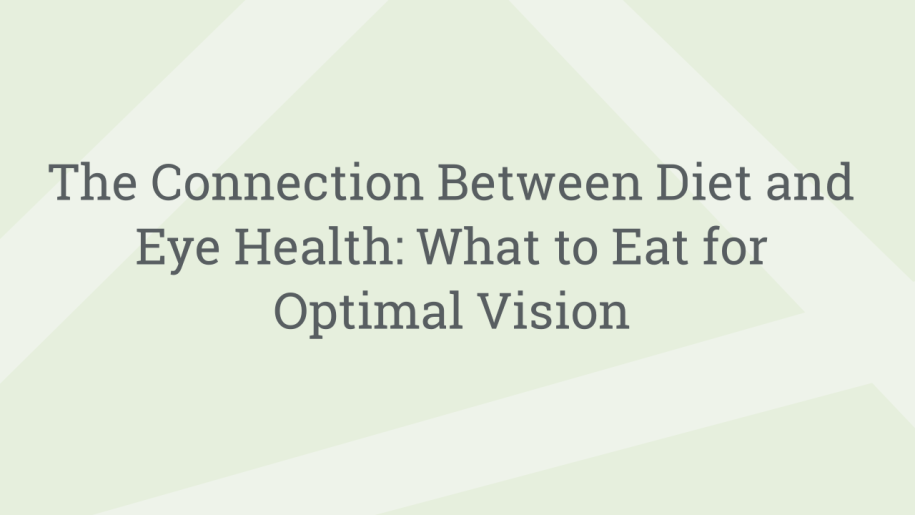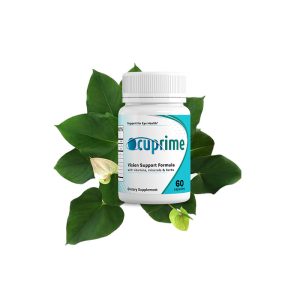The Connection Between Diet and Eye Health: What to Eat for Optimal Vision
Table of Contents
Introduction
As the saying goes, “we are what we eat.” This is especially true when it comes to our eye health. What we eat has a significant impact on our vision, and a lack of proper nutrients can lead to vision problems or even blindness. On the other hand, a diet rich in key nutrients can help maintain and even improve our vision. In this blog, we’ll explore the link between our diet and eye health, and discover some practical tips for making sure we get the right nutrients to keep our eyes healthy and functioning at their best.
The Role of Nutrition in Eye Health: Why Diet Matters
What we eat affects not only our overall health, but also the health of our eyes. Improper nutrition can lead to a variety of eye problems, from mild issues like dry eyes and blurry vision to more severe conditions like cataracts and macular degeneration. Proper nutrition, on the other hand, can help prevent or slow down the progression of these conditions. The single most essential thing we can do to protect our eyes is to eat a healthy diet.
Key Nutrients for Eye Health: Vitamins, Minerals, and Antioxidants
Several nutrients are crucial for maintaining healthy eyes. These include vitamins A, C, and E; minerals like zinc and selenium; and antioxidants like lutein and zeaxanthin. Each nutrient plays a unique role in the health of the eyes, from protecting against harmful UV rays to improving visual acuity. Making sure we get the right amounts of these nutrients is an easy way to support our eye health.
Foods to Eat for Optimal Vision: Carrots, Leafy Greens, and More
Eating a diet full of nutrient-rich foods is essential for good vision. Some of the most beneficial foods for eye health include carrots, leafy greens, citrus fruits, eggs, and fatty fish. Carrots are known for containing high levels of vitamin A, which is vital for good vision. Leafy greens like spinach and kale are good sources of lutein and zeaxanthin, which protect against harmful blue light. Citrus fruits contain high levels of vitamin C, an antioxidant that helps prevent cataracts. Eggs are a great source of vitamin E, which protects against oxidative damage. Fatty fish like salmon and tuna are rich in omega-3 fatty acids, which help reduce the risk of dry eye and prevent age-related macular degeneration.
Omega-3 Fatty Acids and Eye Health: How Fish and Nuts Can Help
Omega-3 fatty acids are essential for eye health. These healthy fats help reduce inflammation, which can lead to eye problems like dry eye syndrome and macular degeneration. Some of the best sources of omega-3s include fatty fish like salmon, mackerel, and tuna, as well as nuts like walnuts and almonds. Adding these foods to our diet is an easy and tasty way to boost our omega-3 intake and protect our eyes.
Foods to Avoid for Healthy Eyes: High-Fat, Processed, and Sugary Foods
In addition to adding healthy foods to our diet, it’s important to avoid foods that can harm our eyes. Highly processed foods and those high in fat or sugar can lead to inflammation and contribute to eye problems like macular degeneration and cataracts. To maintain optimal eye health, it’s best to limit our intake of these foods and focus on nutrient-dense options instead.
Hydration and Eye Health: How Water Keeps Your Eyes Moist and Healthy
Drinking enough water is essential for every part of our body, including our eyes. When we are dehydrated, our eyes can become dry, itchy, and irritated. To keep our eyes healthy and moist, it’s important to drink plenty of water and avoid dehydration. Experts recommend drinking at least eight glasses of water a day to ensure proper hydration.
The Benefits of a Balanced Diet for Eye Health: How to Incorporate Nutritious Foods into Your Meals
A balanced diet, rich in nutrients and antioxidants, is crucial for maintaining healthy eyes. One of the easiest ways to ensure we get the right nutrients is to eat a variety of colorful fruits and vegetables. Making sure to include foods like spinach, carrots, and blueberries in our meals is an easy way to start. It’s also helpful to plan our meals ahead and experiment with healthy recipes to incorporate these foods into our diet in a way that’s both enjoyable and sustainable.
Supplements for Eye Health: What Works and What Doesn’t
While a balanced diet is the best way to get the nutrients we need for healthy eyes, supplements can be a helpful addition to our daily routine. However, it’s important to choose the right supplements and consult with a healthcare professional beforehand. Some of the most recommended supplements for eye health include omega-3s, lutein and zeaxanthin, and vitamin D. That said, it’s always best to get our nutrients from healthy foods whenever possible.
Conclusion
In conclusion, proper nutrition is essential for good vision and eye health. By incorporating these tips and tricks into our daily routine, we can work to prevent vision problems and maintain optimal eye health. By eating a variety of colorful fruits and vegetables, avoiding sugary processed foods, staying hydrated, and adding nutrient-rich foods like fatty fish and nuts to our diet, we can take a proactive approach to our eye health and ensure our vision is at its best.

